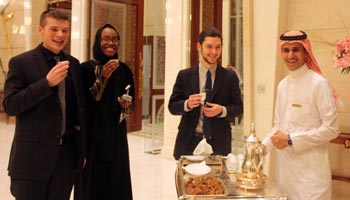The National Council, in partnership with the Saudi Arabian Cultural Mission (SACM) and the Saudi Arabian Ministry of Higher Education (MOHE), organized and escorted a delegation of ten Model Arab League students on a cultural immersion study visit to Saudi Arabia, December 27, 2011 to January 9, 2012. The visit provided the young American leaders a hands-on experience in the Arab world that few others their age have had.

The National Council’s university student study visit to Saudi Arabia provided the young American leaders — each one an alumnus of the Council’s Model Arab League Program and shown here enjoying Arabic coffee and dates — a hands-on experience in the Arab world that many may have dreamed of but few others their age have had.
In the 2010-2011 academic year, nearly 28,000 Saudi Arabian students, forty percent of them females, were enrolled in American universities across the United States. Accompanying them were more than 40,000 spouses and dependents. In marked contrast, fewer than fifty American students in U.S. institutions of higher education were among those privileged over the same period of time in having a firsthand university level educational experience in Saudi Arabia.
In an effort to help narrow this “knowledge and understanding gap,” the National Council has partnered with the SACM and the MOHE. The goal: to provide an empirical educational introduction to the kingdom’s culture and society for a select group of American students who have performed exceptionally well in the Council’s Model Arab League student leadership development program. During the course of the visit, the students met Saudi Arabian educators, business representatives, civil society leaders, and American diplomats in addition to visiting numerous sites of cultural, developmental, and historical interest.
The study visit’s participants were selected from applicants with outstanding records of professionalism, research, debate, and leadership at one or more of the National Council’s 15 Model Arab Leagues in 2011. Led by veteran Council study visit escort and board member Dr. Mario A. Pascale, ten students were chosen from as many different universities involved in the Models, producing a delegation of talented American emerging leaders from institutions of higher education throughout the United States. The students have a minimum of two semesters remaining before completion of their undergraduate degree, ensuring they will have a full year to share what they learned in and about Saudi Arabia with their classmates, professors, and members of their local civic, business, and professional associations.
The program began with a pre-departure orientation session at the National Council’s Washington, DC office. The objective: to introduce the participants to some of America’s and Saudi Arabia’s foremost scholars and specialists on Saudi Arabia and Saudi Arabia-U.S. relations with a view to providing the students with otherwise hard to come by background and perspective on what they would experience and ways of sharing their newfound knowledge and understanding with as many people as possible upon their return to the United States. Upon arrival in-country, the delegation visited Riyadh in the Central Province, Dhahran and Al-Khobar in the Eastern Province, and Jeddah in the Western Province. The delegation met with, among others, H.E. Dr. Abdul Rahman Al-Saeed, Dr. Salwah Al-Hazza, Dr. Abdul Rahman Al-Zamil, HRH Prince Turki Al-Faisal, Mr. Ahmed Al-Shugairy, and U.S. Ambassador to Saudi Arabia James Smith. They also had the opportunity to visit numerous schools in Saudi Arabia, including King Saud University, Al Yamama University, King Fahd University for Petroleum and Minerals, Prince Sultan Center for Science and Technology, and the King Abdullah University for Science and Technology. The study visit enabled the students to meet Saudi Arabians from all ages and walks of life.
